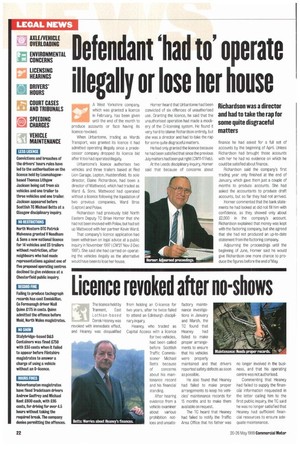Defendant 'had to' operate illegally or lose her house
Page 24

If you've noticed an error in this article please click here to report it so we can fix it.
Richardson was a director and had to take the rap for some quite disgraceful matters
a. A West Yorkshire company,
which was granted a licence in February, has been given until the end of the month to produce accounts or face having its licence revoked.
When Urbantome, trading as Wards Transport, was granted its licence it had admitted operating illegally since a predecessor company dropped its licence bid after it too had operated illegally.
Urbantome's licence authorises two vehicles and three trailers based at Red Lion Garage, Lepton, Huddersfield. Its sole director, Elaine Richardson, had been a director of Mattwood, which had traded as Ward elb Sons. Mattwood had operated without a licence following the liquidation of two previous companies, Ward Bros (Lepton) and Polaw.
Richardson had previously told North Eastern Deputy IC Brian Homer that she had not been involved with Polaw, but had set up Mattwood with her partner Kevin Ward.
That company's licence application had been withdrawn on legal advice at a public inquiry in November 1997 (CM 27 Nov-3 Dec 1997). She said she had carried on operating the vehicles illegally as the alternative would have been to lose her house. Homer heard that Urbantome had been convicted of six offences of unauthorised use. Granting the licence, he said that the unauthorised operation had made a mockery of the 0-licensing system. He found it very hard to blame Richardson entirely, but she was a director and had to take the rap for some quite disgraceful matters.
He had only granted the licence because he had been satisfied that since the previous July matters had been put right (CM11-17 Feb).
At the Leeds disciplinary inquiry, Homer said that because of concerns about finance he had asked for a full set of accounts by the beginning of April. Unless Richardson had brought those accounts with her he had no evidence on which he could be satisfied about finance.
Richardson said the company's first trading year only finished at the end of January, which gave them just a couple of months to produce accounts. She had asked the accountants to produce draft accounts, but so far they had not arrived.
Homer commented that the bank statements he had looked at did not fill him with confidence, as they showed only about 22,000 in the company's account. Richardson explained that money was kept with the factoring company, but she agreed that she had not produced an up-to-date statement from the factoring company.
Adjourning the proceedings until the beginning of June, Horner said he would give Richardson one more chance to produce the figures before the end of May




















































































































